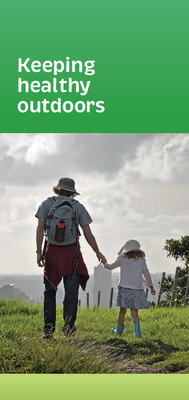Keeping Healthy Outdoors - HE1216

Health and safety information for people who enjoy picnicking, camping, tramping or walking outdoors.
The full resource:
A visit to New Zealand’s great outdoors will take you close to nature in some of the last unspoilt places on earth.
But whether you are planning a picnic or going walking or camping, there are a few simple things to remember to make your trip safe and enjoyable, and protect the area for others to enjoy in the future.
Protect yourself from the sun
Sunburn and skin damage from the sun can lead to skin cancer. Everyone needs to protect their skin and eyes from excessive sun exposure. This is especially important if you are swimming or near water. Do these things all the time, but especially between 10am and 4pm from September to April:
- Wear clothes that cover and protect your skin – some shirts and T-shirts don’t protect you (especially if they get wet).
- Use plenty of sunscreen (of at least SPF30+) 20 minutes before you go out into the sun – check how many hours it will protect you, and reapply it often, especially after being in water or sweating.
- Wear a wide brim hat or cap with flaps and sunglasses.
- Stay in the shade under trees or a sun umbrella.
- Show your doctor any moles or coloured skin lesions that grow or change in size, shape, or colour.
Make sure the water is safe
The water in some lakes, rivers, and streams may carry parasites and bacteria such as giardia, campylobacter, and cryptosporidium, which cause diarrhoea. These are spread by animals, birds, and humans through their faeces.
Make sure that the water you drink and use for washing is safe. This can be done in three different ways.
- Boil the water for one minute – preferably on a portable gas stove (but you can use a suitable fireplace).
- Add regular household bleach to the water (5 drops of plain, unperfumed bleach per litre of water) and wait 30 minutes before drinking. Note: This treatment doesn’t get rid of cryptosporidium.
- Filter the water through an approved filter (Standard AS/NZ4348:1995) – these are available from camping or outdoor equipment shops.
After going to the toilet, wash your hands in a container of water and drain it away from the water source. Alternatively you can use a hand sanitizer with a minimum of 60% alcohol.
Take care with food
It can be difficult to store food safely when you’re camping or having a picnic. Food will spoil quickly if it gets warm, and eating it can make you sick. Food can also attract pests such as insects, wasps, mice, and rats.
- Put the food in containers that can’t be opened or broken by pests.
- Store the food in a cool, shady place. You could use a chilly bin or put the food in a pillowcase and hang it from a tree.
- Wash your hands in safe water before and after handling food – make sure children do this too.
- Use safe water to wash vegetables and fruit, or to wash dishes and containers.
- Cook food thoroughly and eat it right away. Cook only enough for each meal and don’t save leftovers.
- Wash dishes immediately and keep the clean ones covered.
- Take non-perishable food on longer trips.
- Take extra care when hunting, fishing, or collecting shellfish.
Visit Food safety at home | NZ Government (mpi.govt.nz) for more information about food safety.
Poisonous plants
The flowers, berries, and leaves of many native plants may be poisonous when they are touched, chewed, or swallowed. Teach children not to eat plants, berries, roots, or flowers, and to spit out anything that feels as though it is ‘burning’ their mouth.
Keep pests away
Insects, rats, and mice can be a nuisance when you are having a picnic, and when you’re camping or walking in the outdoors.
- Store your rubbish in strong bags, tie them tightly, and remove them as soon as you can.
- Use fly spray or screens.
- Wear trousers and shirts with long sleeves if there are mosquitos or sandflies.
- Use insect repellent on parts of your body that are not covered by clothing – be careful using repellents with young children (always read the label).
Remove your rubbish
Put all your rubbish in strong rubbish bags and tie them carefully.
If there are rubbish bins around, use them. If there are no bins, take the rubbish with you when you leave. Campervan effluent should be emptied at designated dump stations.
Bury toilet waste
Use public toilets when you can. If there are no public toilets around, you must bury your toilet waste.
- Plan ahead – take a trowel and toilet paper with you.
- Find a private area at least 50 metres away from water, walking tracks, huts, and campsites.
- Dig or scrape a hole at least 15 cm deep.
- Bury the waste and cover the hole with loose soil.
- Make sure that children also know what to do and where to go.
Carry a first aid kit
Accidents and injuries can happen anywhere and at any time. A first aid kit will help you treat minor injuries, rashes, and insect bites or stings. It should include things like bandages, pain relief, sunscreen, insect repellent, personal medications, and antihistamine tablets.
Being outdoors in New Zealand is a great experience.
Following these guidelines will help make it more enjoyable.
For more information, look for the care codes around water and on the Department of Conservation website: http://www.doc.govt.nz/parks-and-recreation/know-before-you-go/care-codes/
For a more complete list of what your kit should contain, see the Mountain Safety Council website: Mountain Safety Council New Zealand — Supplies
Code: HE1216